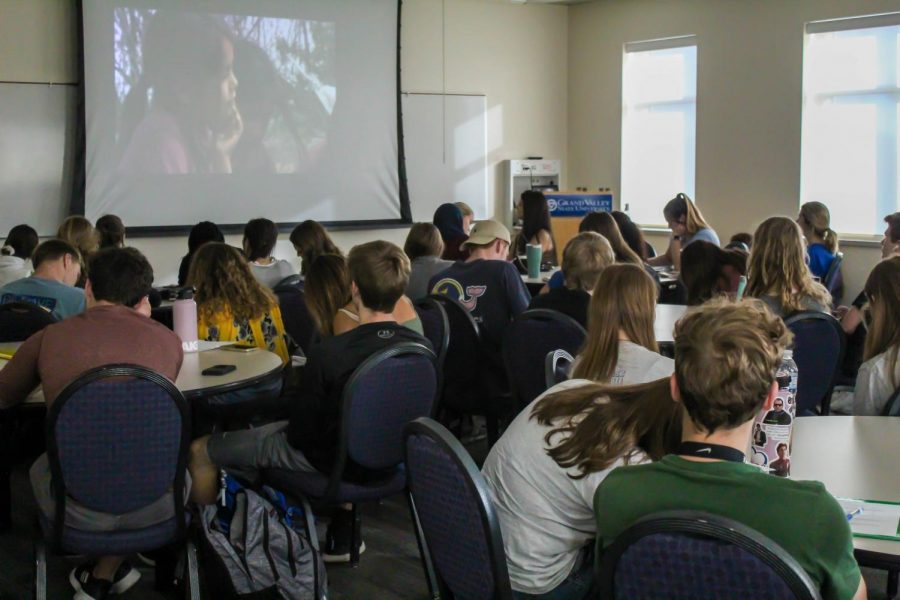Counseling Center hosts “Unnatural Causes”
Sep 23, 2019
Social issues of health and health care in the United States have become recognized more and more as predetermining factors for fruitful and long lasting life. Grand Valley State University’s Counseling Center will be hosting seven short documentaries for their series “Unnatural Causes.” This series will feature the influence of these factors and their role in real-life situations.
“This seven part series focuses in on the intersection of health and social determinants,” said Melissa Selby-Theut, University Counseling Center Assistant Director of Prevention and Community Education. “It covers how race, gender, geography, socioeconomic standing and immigration status impact health in the United States.”
This Thursday-evening series kicked off Sept. 19 and will continue through Nov. 21. The showings take place in the Kirkhof Center room 2270 and will be held from 6-7 p.m..
“We have been doing this for a number of years with great success,” Selby-Theut said. “It has been really well attended. We often have overflow in our room due to so many people that have an interest.”
The documentaries last approximately 30 minutes and will feature a wide variety of stimulating topics related to health. Each evening of the series will be an opportunity to learn about something new and dive into a whole new perspective. When students arrive to Unnatural Causes, they will be greeted by the Pure Education Staff who will introduce themselves and communicate more information about the university’s Counseling Center.
“We introduce the Counseling Center so that students know we exist, which is how we create access in our community more largely,” Selby-Theut said.
Each episode displayed is unique and different from the last. The titles in order of appearance are ‘In Sickness and in Wealth,’ ‘When the Bough Breaks,’ ‘Becoming American,’ ‘Bad Sugar,’ ‘Place Matters,’ ‘Collateral Damage’ and ‘Not Just a Paycheck.’ Each documentary is followed by an instructor-led discussion. This provides a conversation to talk about the eye-opening concepts learned and display personal thoughts.
“Afterwards, our pure education teams opens discussion about issues of social justice, inequities and the way those intersect with our physical health and mental health and our wellness within our community,” Selby-Theut said.
This series is approved for going towards LIB 100 and LIB 201 credit, and in addition professors across GVSU are offering extra credit to students for attending,
“Sometimes Public Health, or Nursing, or Biomedical Sciences where this kind of information is really pertinent, professors will offer their students extra credit,” Selby-Theut said. “We have a lot of students within our university that are going into health sciences and we want a campus community who are critical thinkers and go out to enact change when they are working in their professions.”
The University Counseling Center partners with the Student Nursing Association (SNA) and Brooks College of Interdisciplinary Studies in order to craft this large documentary series together. The UCC and SNA utilize their resources to make it as informative and enjoyable as possible.
“Those who are in SNA participate in activities within the campus community to remain in the organization,” Selby-Theut said. “This is one of their approved events.”
A popular aspect of Unnatural Causes is that students don’t have to worry about missing an episode and being unsure about what’s going on. The episodes are not in any consecutive order, so students and faculty can enjoy those that interest them the most without worrying about being up to date.
Unnatural Causes has not only encouraged students to enact change in their community, but has also left them with something to rest their minds on moving forward. This annual series’ goal is to have students that are socially aware and active in social justice understand how it relates to the healthcare field in a larger aspect.
“We want to get people thinking about issues of equity, social justice and health,” Selby-Theut said. “I think it’s really easy to just talk about how inequity’s exist, but the series really delves into the degree to which those inequity’s exist and how they can actually lead to premature death.”






















